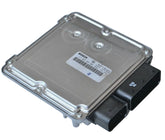Integral Active Steering (IAS) is an advanced steering system found in many modern vehicles, including high-end BMW models. It enhances driving dynamics by adjusting the steering ratio based on speed, providing more agility at low speeds and greater stability at high speeds. However, like any complex system, Integral Active Steering can experience issues that affect performance, safety, and comfort. If not addressed promptly, these problems can lead to costly repairs and compromised handling.
In this blog, we’ll discuss common problems associated with Integral Active Steering, their causes, and how to fix them. Whether you’re dealing with a malfunctioning steering module or error codes on your dashboard, understanding these issues can help you maintain a smooth driving experience.
How Integral Active Steering Works
Integral Active Steering uses an electronically controlled actuator to adjust the front and rear wheel angles dynamically. At low speeds, the system increases maneuverability by turning the rear wheels opposite to the front wheels. At high speeds, it enhances stability by turning all wheels in the same direction. This technology improves cornering, parking ease, and highway stability, making it a valuable feature in modern vehicles.
Common Issues with Integral Active Steering
1. Steering Angle Sensor Malfunction
What It Means: The steering angle sensor provides critical data to the ECU to determine how much the wheels should turn. A faulty sensor can lead to incorrect steering responses, making the car feel unstable or unresponsive.
Possible Causes:
- Dirt or debris affecting sensor readings
- Electrical faults in the wiring or sensor
- Damage due to impact or wear
Fixes:
-
Clean or replace the steering angle sensor
-
Check for loose or damaged wiring connections
-
Perform an ECU reset to recalibrate the sensor
2. Steering Wheel Stiffness or Resistance
What It Means: Some drivers experience increased steering resistance, making it difficult to turn the wheel, especially at low speeds. This can be caused by issues within the Integral Active Steering system or hydraulic components.
Possible Causes:
-
Faulty power steering motor or actuator
-
Low hydraulic fluid levels
-
Software issues within the ECU
Fixes:
-
Check and refill power steering fluid if necessary
-
Inspect the power steering motor for damage
-
Perform a software update or ECU reset to restore proper function
3. Warning Light for Steering Malfunction
What It Means: If the dashboard displays a steering-related warning light, the system has detected an error. This could indicate a temporary glitch or a serious malfunction requiring immediate attention.
Possible Causes:
-
Malfunctioning steering control unit
-
Calibration issues after battery replacement
-
Software glitches in the ECU
Fixes:
-
Scan the system with an OBD-II diagnostic tool to retrieve error codes
-
Reset the ECU and perform a software update
-
Replace or repair the steering control module if necessary
4. Loss of Steering Assistance
What It Means: Drivers may notice that the Integral Active Steering system is not responding, causing the car to handle like a traditional steering system. This can occur suddenly and impact driving performance.
Possible Causes:
-
Failed electric actuator in the IAS system
-
Faulty sensors providing incorrect data
-
Software malfunction or ECU failure
Fixes:
-
Inspect and replace the electronic actuator if faulty
-
Check the steering angle sensor and recalibrate if needed
-
Reset the steering system and update the ECU software
5. Clicking or Grinding Noises While Turning
What It Means: Unusual noises when turning the wheel could indicate a problem with the steering linkage, actuator, or gears inside the Integral Active Steering system.
Possible Causes:
-
Worn-out actuator components
-
Loose steering column connections
-
Internal gear damage in the steering module
Fixes:
-
Inspect and tighten any loose steering components
-
Replace damaged actuators or gears within the steering system
-
Lubricate moving parts to reduce friction and noise
How to Diagnose Integral Active Steering Issues
-
Use an OBD-II Scanner – Connect an OBD-II scanner to retrieve error codes related to the steering system.
-
Check Steering Fluid Levels – Low power steering fluid can affect system performance.
-
Test Steering Responsiveness – Turn the wheel at low and high speeds to check for inconsistencies.
-
Listen for Unusual Sounds – Clicking or grinding noises could indicate internal wear.
-
Perform a System Reset – Resetting the ECU may resolve minor software glitches.
How to Prevent Steering System Failures
-
Schedule regular maintenance and inspections to catch issues early.
-
Avoid sudden impacts or aggressive driving that can damage steering components.
-
Keep software updated to ensure the ECU is running the latest version.
-
Check fluid levels regularly to prevent power steering failure.
Why Proper Steering Maintenance Matters
A well-functioning Integral Active Steering system ensures:
-
Better Handling and Stability – Improved response at both low and high speeds.
-
Increased Safety – Reduces the risk of steering-related accidents.
-
Lower Repair Costs – Early detection of issues prevents expensive replacements.
-
Enhanced Driving Comfort – Smoother and more precise control over the vehicle.
At Automan, we provide high-quality pre-owned steering control units and Integral Active Steering modules to keep your vehicle performing at its best. Whether you need a replacement steering ECU or expert guidance on troubleshooting issues, we are here to help.
Frequently Asked Questions (FAQs)
1. Can I drive with a malfunctioning Integral Active Steering system?
It depends on the severity of the issue. If the system has failed completely, the car may still be drivable but with reduced handling performance. However, it is recommended to get it checked immediately.
2. How much does it cost to fix an Integral Active Steering issue?
Repair costs vary depending on the problem. A sensor replacement can cost between $200 and $500, while a steering control module replacement may range from $800 to $2,500.
3. How do I reset my Integral Active Steering system?
Most vehicles allow a system reset through an OBD-II scanner. If you recently replaced the battery, try turning the wheel fully left and right a few times to recalibrate the system.
4. What causes an Integral Active Steering failure?
Common causes include sensor malfunctions, actuator failure, power steering fluid issues, and software glitches within the ECU.






